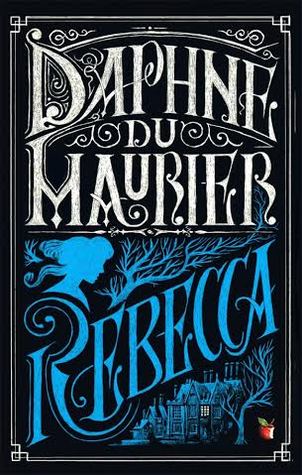BOOK REVIEW:Rebecca by Daphne du Maurier ★★★★☆

WARNING. SOME SPOILERS AND SWEARING.
Rebecca has won the National Book Award for Fiction (1938) and the Anthony Award for Best Novel of the Century. Rebecca has been made into a feature film directed by Alfred Hitchcock in 1940 and TV miniseries in 1997.
I’m normally drawn to books through dialogue. The story opens up with a very descriptive house and how it looks like in its depleted current state. We all know the famous first line of this story.
‘Last night I dreamt I went to Manderley again.’ Manderley was the greatest house in Cornwall, England, home to Maxim de Winter.
Set in a flashback, the nameless character (let’s call her Madam for this review) a young, clumsy, daydreamer meets a wealthy, handsome widower in Monte Carlo. She is under the care of Edith van Hooper, a bossy woman teaching Madam how to be a companion. The widower, Maxim proposes to Madam, they marry and are off to Manderley. Once they get there, Madam feels isolated in a vast house. Everything that she touches once belonged to the first wife, Rebecca; a woman whose presence still lingers in the house despite her tragic death.
By the sounds of the synopsis I was expecting this to be a ghost story and I’m glad that it wasn’t. Instead, it was an eerie and sad story as opposed to scary.
But let’s just talk about the characters (then the themes) because it's them that make this book a classic.
Rebecca. Rebecca. REBECCA!!! She’s not present in the story yet Rebecca de Winter’s presence is reminded in Manderley; from how the house used to run to her constant appraisal of beauty and brains. Everyone simply ‘adored her’ but she was a complicated character. To the world she’s flawless but behind closed doors was a different story. This story is about Rebecca but then it isn’t.
It’s actually about the nameless narrative that is referred to as ‘Mrs de Winter’ or ‘Madam’. Madam describes herself as a school girl with no worldly experience. After her father’s death, she really hasn’t got much going for her. When she marries Maxim and gets to Manderley, she basically lives in the shadows of the former Mrs de Winter. She’s constantly reminded of what Rebecca used to do by Mrs. Danvers, the housekeeper. Madam is unsophisticated and timid, unlike the predecessor.
Maxim de Winter is a brooding man in early forties. He’s easy on the eyes but a withdrawn character harbouring a secret. he’s intelligent, mysterious but tormented by the memory of his first wife. Back in Manderley, Maxim dislikes talking about Rebecca and increasingly detaches himself from his new wife.
Mrs. Danvers, Rebecca’s maid and housekeeper of Manderley is one hell of a sneaky bitch. From the very moment she meets the new Mrs de Winter, she is set to humiliate the poor woman and punish her for taking Rebecca’s place. She gets to the point where she urges Madam to jump out of the window. Through the book, it's revealed Mrs. Danvers had an unhealthy obsession with Rebecca because she didn’t properly grieve for her.
Rebecca deals with poignant themes of jealousy and obsession, good versus evil, love and hate. As Madam is constantly reminded of the first wife, it’s no surprise that she is jealous of Rebecca. Mrs. Danvers devotion to Rebecca crosses the line of obsession as all of Rebecca’s belonging and the room is still in its rightful place. There is the fight of good versus evil within the characters. Maxim is seen as the hero to sweep Madam of her feet, yet his action behind Rebecca’s death show his anger. Similarly, while Mrs. Danvers is presented as the antagonist of the novel who actively strives to undermine the narrator, she is also an individual who is overwhelmed with grief at the loss of her friend and mistress. Likewise, the love and hate in Rebecca serve as crucial motivational tools for the primary characters.
Whilst reading Rebecca I really wanted to know why we, as the reader, never knew Madam’s real name. Identity is the key reason. Madam never felt unique and when she did marry Maxim she was trusted with a name and the identity of the lady of Manderley. She never felt suited to the role of being Mrs de Winter because she was no were near Rebecca’s league. So du Maurier never gave the main character a name because Madam was still searching and if not that then stuck living with one identity given to her.
As much as I loved the characters in Rebecca, at times I felt quite annoyed with them. It might be because of the social norms of that times period.
At times Madam did my head in. I do feel some pity for her at times when she was clueless as to how to run Manderley, or when Mrs. Danvers was a solid bitch to her. Other than that Madam seemed to escape into her own little world and thinks about what others would be doing. In a way, she doesn’t want to face reality. And at times Maxim annoyed me. He would undermine Madam, treat her like a dog and a child by patting her head (bitch no! no one pats my head). It could be the age difference of twenty years that Maxim feels like he did marry a clueless woman.
There’s a reason why this is a classic. It has everything you’d want in a gothic tale; dark secrets, stately homes, and creepy characters. I wish I read this book sooner but I’m glad I read this now. It’s a book I’ll surely read again. Jane Eyre defined the gothic romance genre and surely Rebecca follows in its footsteps.
Rating: 4/5
Publishers: Virago
First published May 1938
Second Publication Date: July 16th, 2015
Genre: Mystery/Romance/Gothic/Classics




















Comments
Post a Comment